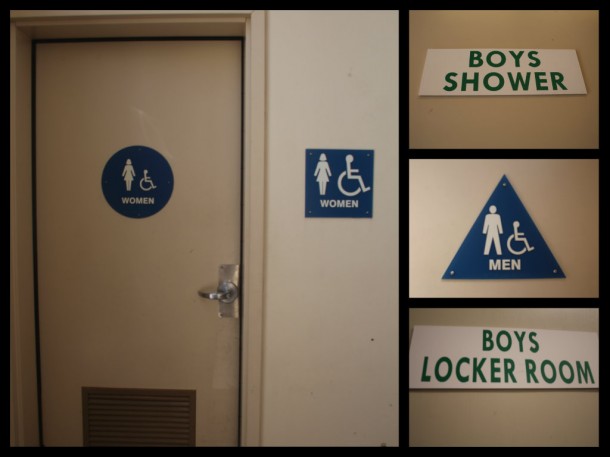
On Jan. 1, 2014, the recently signed Assembly Bill 1266 will go into effect across California, permitting students to “participate in sex-segregated school programs and activities, including athletic teams and competitions, and use facilities consistent with his or her gender identity, irrespective of the gender listed on the pupil’s records.”
In other words, a student who has the physical features of a male but identifies as a female will be able to use the girls’ bathrooms and locker rooms, as well as play and practice with a girls’ sports team, and the same goes for a female student who identifies as a male.
Signed less than two months ago, this bill covers no small point. The facilities it refers to include school restrooms, locker rooms and showers, and it applies to all K-12 students who are enrolled in California public schools.
Assistant Principal Jerry Berkson said that the administration is prepared to adhere to the new ordinance when it goes in effect.
“We would make any changes necessary to comply because we have to,” Berkson said.
Berkson answered that he did not think the administration would have to make any changes in writing once the bill comes into effect.
“It’s always a case by case basis,” Berkson said. “It would be best to talk with the student first to see what they want to do, and then we can make adjustments from there.”
After first hearing of the bill, many students at Paly said they felt conflicted about whether or not they support AB 1266. The most common reaction in the Palo Alto High School community seems to be along the lines of While I think it’s important to support transgender students’ rights, at the same time I don’t think we should make other people uncomfortable. A big question that has been raised is, how do we determine the right balance, and how can we find that balance in Palo Alto?
Junior Jaisel Sandhu did not predict a major change in the day-to-day school experience.
“I don’t really think it’s going to create any problems,” Sandhu said. “I personally don’t really have a problem with it. I don’t know about how other people will feel about this. I don’t know if any other bills like this have been passed.”
As it turns out, AB 1266 is the first of its kind in the United States, leaving California to be the first state to test these controversial waters.
Senior Alex Grandy said she supported transgender students gaining more rights and freedom, but also voiced a concern she felt the bill brought up concerning sports teams.
“With the sports team, some people might be afraid to be as physical they were,” Grandy said. “Like with a guy team, if a girl who wants to be a guy is on the team it might make the rest of the team feel uncomfortable.”
Many echo Grandy’s opinion that this situation could make practices and games for both teammates and opposing teammates of very uncomfortable. However, supporters of the bill argue that the goal of this bill is not merely to grant transgender students the full opportunity to succeed in school, but to also bring about social change.
Openly gay political activist Dennis Chiu, who currently holds a public office on the El Camino Hospital Board, explained how the bill faces the community with a challenge of determining what social conventions will still be held.
“The greatest difficulty for schools in Palo Alto and around this State under AB 1266 is not that it will affect the quality of education, but it will affect a social convention, which may be called a ‘value’ or ‘moral’ by some,” Chiu said. “However, I have trouble accepting the premise that an individual acting as who he or she fundamentally is has any real impact on another person’s morals or values.”
English teacher Kindel Launer does not think this will make a big impact on the social convention at Paly.
“I know at Paly we’ve already…been able to provide restroom access, locker room access, and access to sports teams [for transgender students],” Launer said. “So I think for Paly, it’s not a big deal. I feel like we’ve already done that.”
Whether the Paly community feels a change or not, every public school in California will be soon under this new ordinance, when AB 1266 goes into effect Jan. 1, 2014.


E. Ann • Sep 23, 2013 at 9:37 pm
The issue is not about protecting the privacy and rights of
transgender students, but of the many thousands of girls who will have
boys next to them in shower stalls and bathrooms, and vice versa.
AB
1266 is so poorly drafted that the student claiming a gender identity
opposite his or her actual gender needs no evidence that he or she
actually identifies with the opposite gender. There is no requirement
that the person have ever presented himself or herself at school or home
as the opposite gender. And there is no requirement that the student’s
parents be involved in the decision. The legislation is wide open for
abuse.
There is a repeal effort underway by parents and teachers
at http://privacyforallstudents.com/.
They need 505,700 signatures by
November 10th to put this matter on the ballot so Californians can
decide this issue.